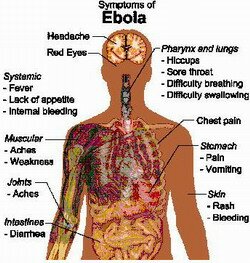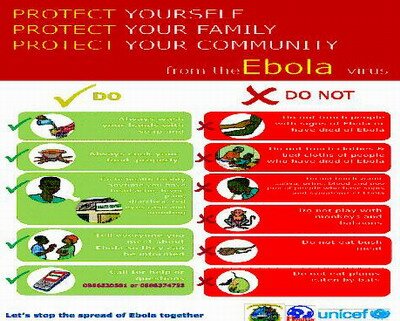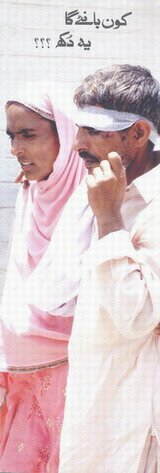|
|
|
Ebola Virus Disease
|
|
Ebola virus disease (EVD) or Ebola hemorrhagic fever (EHF) is the most virulent human viral disease caused by the Ebola virus, often fatal illness with a highest fatality rate. Symptoms start 2 days to 3 weeks after contracting the virus, with fever, sore throat, muscle pains, headaches, nausea, vomiting and diarrhea followed by decreased hepato-renal functioning. Later on some people begin to have bleeding problems.
|
|
Fig. Electron micrograph of Ebola Zaire virus. This is the first photo ever taken,on 10/13/1976 by Dr. F.A. Murphy, now at UC Davis, then at CDC.

|
|
Epidemiology:
Ebola virus was first isolated in 1976 during 2 simultaneous outbreaks of Ebola hemorrhagic fever in Yambuku, Democratic Republic of Congo (Zaire) and Nzara, Sudan with the highest case fatality rate (50% - 90%). The disease was given the name Ebola because of the location of the affected village of Democratic Republic of the Congo (Zaire) on the Ebola River.
The disease is notifiable or reportable in most Western countries. It is genetically unique zoonotic animal borne, severe and rare disease, which affects human and non-human primate and typically occurs in outbreaks in tropical regions of Sub-Saharan Africa. From 1976 to 2013, about 1,000 people / year have been infected. The largest ongoing 2014 West Africa Ebola outbreak is affecting Guinea, Sierra Leone, Liberia and Nigeria. To date as of October 17, 2014, 8993 total suspected or confirmed cases (5002 laboratory-confirmed) had been reported in these countries, resulting in 4492 deaths
|
|

|
|
Signs and symptoms
Symptoms may appear anywhere from 2 to 21 days after exposure to Ebola virus though 8-10 days is most common. These include:
� Fever,
� Headache,
� Joint and muscle aches,
� Weakness,
� Diarrhea,
� vomiting,
� stomach pain and lack of appetite
� Some patients may experience: rash, red eyes, hiccups, cough, sore throat, chest pain, difficult breathing, difficult swallowing, bleeding from different sites of the body.
|
|

|
|
Transmission
In the 2014 Ebola outbreak, nearly all of the cases are a result of human-to-human transmission. Healthcare providers and the family and friends in close contact with Ebola patients are at the highest risk. A person infected with Ebola virus is not contagious until symptoms appear.
� Virus spreads through direct contact with the bodily fluids (blood, urine, feces, saliva, and other secretions) of an infected person, or with objects like needles that have been contaminated with the virus.
� Ebola does not spread through the air or by food or water.
� Can spreads in the community through human-to-human transmission from direct contact (through broken skin or mucous membranes) with the blood, secretions, organs or other body fluids of infected people, and indirect contact with environments contaminated with such fluids.
� Through burial ceremonies in which mourners have direct contact with the body of the deceased
� Health-care workers have frequently been infected while treating patients with suspected or confirmed EVD.
� In Africa, infection has been documented through the handling of infected chimpanzees, gorillas, fruit bats, monkeys, forest antelope and porcupines found ill or dead or in the rainforest.

|
|

Incubation period:
The average Incubation period is 8 to 10 days, but it can vary between 2 and 21 days.
Diagnosis
� Acute infections will be confirmed using a real-time RT-PCR assay
� Serologic testing (IgM and IgG antibodies) are required to monitor the immune response in confirmed EVD patients
� The medical history, especially travel and work history along with exposure to wildlife are important to suspect the diagnosis of EVD.
� Leukopenia with lymphopenia followed later by elevated neutrophils and a left shift.
� Platelet counts are often decreased in the 50,000 to 100,000 range.
� Amylase, Hepatic transaminases, fibrin degradation products, Prothrombin (PT) and partial thromboplastin times (PTT) may be elevated
� Proteinuria may be present.
� Initially exclude common ailments like malaria, typhoid fever, shigellosis, cholera, leptospirosis, plague, rickettsiosis, relapsing fever, meningitis, hepatitis and other viral hemorrhagic fevers.
Sample Collection and Transportation in Pakistan:
Exercising standard precautions, samples must be transported to NIH; duly labeled / packed in triple packaging to the Department of Virology, Public Health Laboratories Division, National Institute of Health, Islamabad along with detailed clinical information and travel / contact history on standard Lab request form

Management
General principles of care are as follows:
� Supportive therapy with attention to intravascular volume, electrolytes, nutrition, and comfort care is of benefit to the patient
� Such therapy must be administered with strict attention to barrier isolation; all body fluids contain infectious virions and should be handled with great care
� No specific therapy is available that has demonstrated efficacy in the treatment of Ebola hemorrhagic fever
� There are no commercially available Ebola vaccines.
In those patients who do recover, recovery often requires months, and delays may be expected before full resumption of normal activities. Weight gain and return of strength are slow. Ebola virus continues to be present for many weeks after resolution of the clinical illness.
Prevention:
� Early recognition is critical for infection control. Any patient with suspected Ebola needs to be isolated until diagnosis is confirmed or Ebola is ruled out.
� Healthcare providers should consider travel history, symptoms and risks of exposure before recommending Ebola diagnosis.
� Patients should be placed in a single room, containing a bathroom with the door closed.
� Facilities should maintain a log of all persons entering the patient�s room.
� All persons entering the patient room should wear at least: fluid resistant or impermeable gloves, gown, eye protection (goggles or face shield), and a facemask.
� Additional Personal protective equipment might be required in certain situations e.g., copious amounts of blood, other body fluids, vomit or feces present in the environment.
� Meticulous environmental cleaning and disinfection and safe handling of potentially contaminated materials is vital as blood, sweat, emesis, feces and other body secretions represent potentially infectious materials.
The duration of precautions should be determined on a case-by-case basis, in conjunction with local, state and federal health authorities.


Travelers:
If you travel to any of the four affected countries, make sure to do the following:
� Practice careful hygiene.
� Avoid contact with blood and body fluids.
� Do not handle items that may have come in contact with an infected person�s blood or body fluids.
� Avoid funeral or burial rituals that require handling the body of someone who has died from Ebola.
� Avoid contact with animals or raw meat.
� Avoid hospitals where Ebola patients are being treated.
� Seek medical care immediately if you develop fever, headache, bodyaches, sore throat, diarrhea, vomiting, stomach pain, rash, or red eyes.
� Pay attention to your health after you return.
� Monitor your health for 21 days if you were in an area with an Ebola outbreak, especially if you were in contact with blood or body fluids, items that have come in contact with blood or body fluids, animals or raw meat, or hospitals where Ebola patients are being treated.
Seek medical care immediately if you develop fever, headache, achiness, sore throat, diarrhea, vomiting, stomach pain, rash, or red eyes.

|
|
Prognosis:
� The disease has a high mortality rate: often between 50 -90%.
� If an infected person survives, recovery may be quick and complete.
� Prolonged cases are often complicated by the occurrence of long-term problems, such as inflammation of the testicles, joint pains, muscle pains, skin peeling or hair loss eye symptoms, such as excess tearing, light sensitivity, red eye, etc.


|
|
|
| |
|
|
|
|
Polio Drops Timings
08:00 AM to 01:00 PM (Outdoor)
Friday 08:00 AM to 12:00 AM (Outdoor) |
| __________________ |
The Administration of LGH has cancelled the MOU
with NTS Authority regarding recuritment of staff
Applications submitted through NTS will not be
entertained.LGH will soon announce the date of
receipt of applications. |
| __________________ |
March for Army Public School(Peshwar)
Chief Organizer:
Prof. Khalid Mehmood
Principal PGMI/AMC/LGH
Chief Guest:
Guest of Honour:
Mr. Khawaja Salman Rafique (Advisor to CM on Health)
Date:14th December 2015
Venue:
From PGMI to Shadman Chowk |
| __________________ |
Workshop on Lysosomal Storage Diseases (LSDs)
Chief Organizer:
Prof. Agha Shabbir Ali
Head of Pediatrics Department
Venue:
Conference Room Pediatric Ward , LGH, Lahore.
Date:Tuesday, 5th January 2016th,
Time:9:00 AM 12:00 |
| __________________ |
Walk on World Diabetes Day
Chief Organizer:
Prof. Ghias Un Nabi Tayyab
Prof. of Medicine.
Organising secretary:
Dr. Muhammad Imran Hasan
Associate Prof. of Medicine PGMI/LGH
Organize By:
DEMC/PGMI/LGH, Medical Unit-I, LGH, Lahore.
Chief Guest:
Mr. Sohail Ahmed (Azizi).
Date:14th November 2015
Time:
11:00 AM
Venue:
From LGH Emergency Gate to Stall Area
Last date for registration:
26-10-2015 |
| __________________ |
Diabetes Education Workshop
Chief Organizer:
Prof. Ghias Un Nabi Tayyab
Prof. of Medicine.
Organising secretary:
Dr. Muhammad Imran Hasan
Associate Prof. of Medicine.
Venue:
Gastro Auditorium, Medical Unit-I, LGH, Lahore.
Date:30th - 31st October 2015
Contact:
0332-2368486
Last date for registration:
26-10-2015 |
| __________________ |
15th Workshop on Dengue Fever
Chief Organizer:
Prof. Agha Shabbir Ali
Head of Pediatrics Department
Venue:
Conference Room Pediatric Ward , LGH, Lahore.
Date:Saturday, August 29th, 2015
Time:9:00 AM 11:15 AM |
| __________________ |
2nd Alumni of PGMI
Venue:
Ali Institute Auditorium, Ferozepur Road, Lahore.
Near Gulab Devi Hospital
Registration (Last Date):Saturday, June 06, 2015
Registration Fee:
Professor Rs.2,000/-
Associate Prof. Rs.1,500/-
Assistant Prof. Rs.1,500/-
Demonstrator/PGR Rs.1,000/-
Date:Wednesday, June 10, 2015
Time:05:00 PM |
| __________________ |
2nd THALASSEMIA WORKSHOP
Venue:
Conference Room Pediatric Ward LGH, Lahore.
Date:Thrusday, June 11th, 2015
Time:9:00 AM 02:00 PM |
| __________________ |
2nd Workshop on Neonatal Resuscitation
Venue:
Conference Room Pediatric Ward LGH, Lahore.
Date:Saturday, June 13th, 2015
Time:10:00 AM 01:00 PM
Registration Contact:Dr Rizwan gohar Senior registrar
03004204215 email. [email protected]
Headed By:Prof Agha shabbir ali , Prof Rashid Mehmood |
| __________________ |
5th 17th Annual Conference of
Anaesthesiology & Critical Care
Organised by:
Department of Anesthesia, PGMI/AMC/LGH
Supervised by:
Prof. Khalid Bashir,
HOD,Department of Anesthesia, PGMI/AMC/LGH
Venue:
Pearl Continental,Lahore
Date:Friday-Sunday, April 03-05, 2015 |
| __________________ |
5th Symposium & Live Workshop on Endourology
(PCNL, TVT/TOT, LAPROSCOPIC SURGERY)
Organised by:
Department of Urology, PGMI/AMC/LGH
Supervised by:
Prof. Safdar Ali Shah,
HOD,Department of Urology, PGMI/AMC/LGH
Contact:
0333-8417898
Venue:
Department of Urology, PGMI/AMC/LGH
Date:Monday, February 23, 2015
Time:09:00 AM to 03:00 PM |
| __________________ |
Fetal Surveillance
(Pre-Conference Workshop)
Antenatal Fetal Surveillance
Intrapartum Fetal Surveillance
NICHD-FHR Classification & Suggested Management
Fetal Surveillance of Surgically Correctable Fetal Anomalies
3rd Trimester Fetal Surveillance by Ultrasound
Organised by:
Department of Obs. & Gynae., PGMI/AMC/LGH
Prof. Nuzhat Khawaja
Prof. of Obs. & Gynae., PGMI/AMC/LGH
Dr. Naela Tarique
Associate Prof. of Obs. & Gynae., PGMI/AMC/LGH
Secretary:
Dr Farzana Latif, Assistant Prof., PGMI/AMC/LGH
Venue:
Neuro Auditorium, LGH, Lahore.
Registration:
Free.
Date:Friday, February 13, 2015 |
| __________________ |
Basic Knee Arthroscopy Workshop
Organized By:
Department of Orthopaedic Surgery, PGMI/AMC/LGH
Collaboration with:
Pakistan Orthopaedic Association
Venue:
Learning Resource Center
Department of Orthopaedic Surgery, PGMI/AMC/LGH
Registration Fee:Rs. 1000
(Limited seats)
Contact:Mr. Muhammad Akram
0345 4703901
Date:February 11, 2015 |
| __________________ |
Seminar: Dengue Fever Diagnosis & Management
Organizer:
Prof. Dr. Jawad Zaheer
Prof. of Medicine.
Presenter:
Dr. Kashif Aziz Ahmad
(MD, FCPS)
Venue:
Medical Unit-II, LGH, Lahore.
Date:Monday, January 19, 2015, 10:30 AM |
| __________________ |
Award Distribution Cermony
Organized By:
Prof. Irfan Mehboob
Prof. of Orthopaedic.
Venue:
Department of Orthopaedic Surgery, LGH, Lahore.
Date:January 17, 2015
Time:11:30 AM to 12:30 PM |
| __________________ |
5thAnnual Scientific Symposium
BLS Workshop
Organised by:
Department of Pediatrics, PGMI/AMC/LGH
Prof. Agha Shabbir Ali
Prof. of Pediatric, PGMI/AMC/LGH
Venue:
Conference Room, Pediatric Department, LGH, Lahore.
Date:Wednesday, January 14, 2015 |
| __________________ |
|
| |
|
|
| |
|

|
| |
|
|
Visitor Counter
|
| |
| |
|
|
| |
| |
| |
| |
|
|